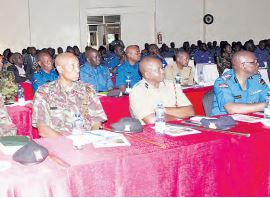
The government is losing more than Sh71 billion in revenue annually to illicit alcoholic drinks, a study has revealed.
The Alcohol and Beverages Association of Kenya said the value of the illicit alcoholic products being consumed in the country continues to rise.
A study conducted last year by Euromonitor International which collects data on markets globally said about 59 per cent of alcoholic beverages sold locally is illicit.
Zack Munyi, chairperson of the public policy committee at ABAK said this is despite an earlier research conducted in 2018 by World Health Organisation placing the prevalence of illicit liquor at 40 per cent.
“That means out of 10 beers you buy, six are likely to be illegal.
This is a major concern for the association. Our biggest concern is public health because consumption of illicit liquor comes with a heightened health burden,” he said.
Munyi spoke during a sensitisation forum of senior police officers from Kirinyaga and Murang’a counties on Tuesday.
He said as a mitigating factor, ABAK has started forums to sensitise law enforcement officers on how to differentiate legitimate alcohol and illicit liquor.
The officers were taken through some of illicit brands currently which are compromising consumers’ health.
“The study showed the value of illicit alcohol is about Sh67 billion while the government is losing about Sh71 billion in revenue annually. Our target is not the amount of money we’re losing. It’s to restore the credibility of the industry,” Munyi said.
He blamed rising production of illicit liquor on high taxes that drive up the cost of legitimate brands.
“You find that out of 250 ml spirits products, about 51 per cent of the price of the legitimate products goes to taxes. We have no issues paying taxes but when they surpass a certain threshold, they become detrimental to the industry,” Munyi said.
He praised the state for publishing the Tax Laws Amendment Act which has reduced taxes on wines and beers.
The taxes, he said, will be based on the amount of alcohol in a product, commonly known as Alcohol By Volume which could promote responsible drinking.
Munyi said the second driver of illicit liquor trade is lack of knowledge among Kenyans which is what informed the sensitisation forums.
Samuel Matano, the association’s chairperson said they partner with law enforcement officers on many activities.
He said ABAK contracted private investigators to intercept illegal alcoholic products and then share information with law enforcement agencies.
But their efforts are hampered by some sentences issued in courts which are not deterrent enough with offenders paying fines and resuming their illicit trade.
“It becomes a continuous cat-and-mouse game with
offenders. We need to relook at the criminal justice
system to make punishment for such offences more
punitive,” Matano said.










